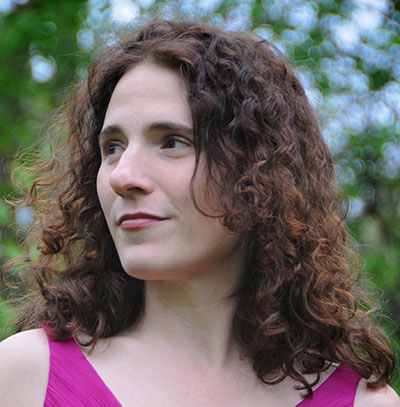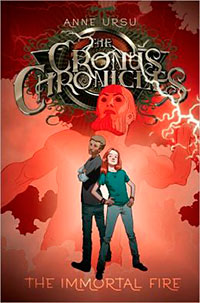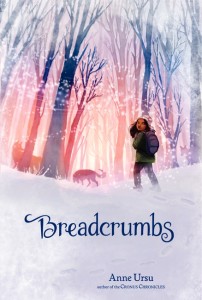Anne Ursu, Author

Photo: John W. Ursu
I recently spoke with Anne Ursu, who has written both adult and young adult novels. She lives in Minneapolis and teaches at Hamline University’s MFA in Writing for Children, which is a low-residency program.
Ursu is the author of five middle grade fantasies as well as two novels for adults. Her most recent book, The Real Boy, won the Horace Mann Upstanders Award and was on the longlist for the 2013 National Book Award. Breadcrumbs, a contemporary retelling of “The Snow Queen,” was named one of the best books of 2011 by Publishers Weekly, Amazon.com, School Library Journal, Bulletin for Center of Children’s Books, and the Chicago Public Library. She is also the recipient of the 2013-2014 McKnight Fellowship in Children’s Literature.
Lisa Trahan: What inspired you to become a writer? Have you always wanted to write or is it something you discovered you wanted to do later on in life?
Anne Ursu: I read a ton when I was a kid. I loved books so much that it seemed natural to me that the next step would be making them. And I think I had an identity as a writer in my school—in seventh grade, we had a scary story competition and I won, and I remember feeling like I only won because I was considered the writer in my grade, not because the story was that good. So, clearly, I’d already mastered the internalized self-loathing that comes with being a writer.
LT: Your novels are written for the middle grades. How did you choose this age group versus younger children or teen fiction?
AU: I started by writing two adult books. It sounds odd, but it didn’t occur to me really that writing children’s books was something you could actually do. But a friend of mine published a middle grade book, and that made it seem possible. And then I read Harry Potter. I loved those books so much and it put me back in touch with all the books I loved as a kid. And then I read a lot that had come out in the last few years and I thought, “I want to do this!” And I never looked back.
I feel like you have a lot of freedom in kids books to play around. It seems you have so much more freedom to switch narrators, use magic, play with structure, and just play around with reality and time. Kids completely expect the world to be more than they understand so when you present them with something unfamiliar it doesn’t bother them at all. So to me it’s a very freeing place to write in.
The middle grade age is such an important age, when you’re trying to figure out what the world is really made of. And that’s a real theme in middle grade fiction, which gives you a lot to write about—especially in fantasy. I would love to write picture books, but I’m not good at it. Picture books are a lot like poems—you need to have such control, such technique, such density. They are very very hard.
LT: I read your book The Shadow Thieves and I felt it addressed a lot of issues and as an adult I really enjoyed it. I didn’t feel like it talked down to kids at all.
I don’t sit down and think, “I’m writing for a child now. What does the child need to hear? What’s appropriate?”
AU: I don’t sit down and think, “I’m writing for a child now. What does the child need to hear? What’s appropriate?” For me when I sit down to write a middle grade book, I think about the kid at the center of the story who needs a character journey, begins in a place where they have to grow, the events of the book will make them grow, and that specifically makes the book appealing to a child reader. And I feel a lot of freedom. But I never ever think I have to simplify anything.
LT: Why did you choose Greek mythology for your series, The Cronus Chronicles?
AU: I loved myths as a kid and when it came time to sit down and write a fantasy, that’s what came out. When the book came out I discovered kids weren’t reading myths in school anymore. But thanks to Rick Riordan and his massively bestselling Percy Jackson series, they now all know the myths. Not because of school, but because they are the books that kids want to read. I just did it because I liked it.
 LT: Speaking of Percy Jackson, you tweeted about The New Yorker and their criticism of children reading Percy Jackson.
LT: Speaking of Percy Jackson, you tweeted about The New Yorker and their criticism of children reading Percy Jackson.
AU: We as a society always have to have this conversation about popular literature versus literary fiction; we don’t talk as much about “here’s a shelf of literary fiction and here’s a shelf of genre fiction.” I mean fantasy can be literary, or not, and kids read all kinds of things. And now our intelligentsia has realized that criticizing adult popular fiction makes them sound kind of like out-of-touch elitist jerks, and so they’re moving to YA, which apparently everyone can denigrate.
I was enraged that the New Yorker picked these books, in particular because Rick Riordan was a seventh-grade teacher, he’s really concerned about reluctant readers, and he made a whole career out of writing books that will start kids reading. And then they keep reading. The New Yorker article offered no evidence, just snobbish speculation that by reading commercial books, kids will be somehow ruined for other books. A friend wrote a response to this essay by pulling out all this actual research about kids and reading; it shows that all it takes is the hook book, the one book they love, and it gets them reading for a lifetime.
But mostly it was so offensive because parents who read the article might not know any better, they want their kids to be smart and good readers, and now they’re thinking, “Are these books bad somehow?” And then the kid who needs that book to get hooked on reading doesn’t get this book—and these books have gotten approximately a jillion kids to get into reading.
I also have a particular problem with the snobbery towards fantasy and I think she was displaying a good deal of it there. She’s saying these books are myths, pretend, fantasy, gods and monsters—when in fact this genre allows you to deal with very serious and very epic themes, about personal responsibility, about social hierarchy and structure, and dismantling societies and the like. Fantasy is very serious business.
The peculiar thing about being in children’s books is listening to the way people outside of it talk about it, and most of the time, they don’t know anything about the field. You see all this stuff about teen books where people are just spouting off all over the place about how these books are ruining America, and they’ve only heard of three teen books. It’s frustrating because I don’t want the conversations that grown up people are having amongst themselves at their erudite cocktail parties to affect the way that kids get books. That’s why we’re all here—to help kids get books. And for me, particularly, having found kid readers to be much hungrier and intellectually curious, creative, and open, than adult readers, it gets me going a little.
LT: I won’t mention John Grisham then (regarding his comments defending a friend of his who was arrested for child pornography).
AU: An interesting thing about 99.5% percent of people who write for children is that they love children. J.K. Rowling loves kids and she’s out there and she’s interacting with them and answering her fan mail, and you feel that Grisham wouldn’t have said any of those things if he really cared about children, and I don’t exactly feel like his books came from a sincere desire to interact with kids. I have nothing against highly commercial books, but I have a lot of trouble with profiting off kids when you don’t give a damn about them.
LT: I’m not sure how much you know about Antioch University and our focus on social justice, and the social responsibility we all have through our art, and representing writing and art as a whole, but when you have a famous writer who makes those comments, it casts a negative light on all of us. We as artists have to take responsibility for what we represent.
AU: I think that’s exactly right. When you are writing for children and teenagers, and when you are an artist in the world, it is important to think about what your place is in this world and what your place is in the broader literary conversation, no matter what you’re writing. You believe the art form matters. You believe this interaction between writer and reader matters, in everything you do and everything you put out there, and when you write for children you hope that somewhere in there you are advocating for children—even if it’s just by giving a crap about them. I love Antioch for that. I think a lot of times in writing programs we can get so internalized because it is our art and our work. But it’s so important to see outside yourself. I love that Antioch teaches that being an artist is about community and the world, and that’s a conversation we have in writing for children a lot, too.
LT: We have been focusing a lot on diversity, racial and otherwise, and how to include people with disabilities, or who don’t just look like us. And I know your novel, The Real Boy, deals with a boy who has autism and even in The Cronus Chronicles, Zee is half black and his grandmother is Malawian, so how important is it for us as writers to bring in characters who are different and not necessarily like typical kids, into children’s literature?
AU: Well, I think we need to expand our notion of what a typical kid is. The white, able-bodied, neurotypical child is the minority—but in children’s books that’s the overwhelming majority. And that’s a huge problem; we’re not serving kids, any kids, and that includes those who see themselves in books all the time.
I wrote the character of Zee to honor my own cousin, who is biracial and his father is Malawian. At the time, I didn’t know anything about the crisis in representation. A few years later when I started to write Breadcrumbs, kids publishing had just gone through a series of conflicts over whitewashed covers. I was spending a lot of time on the internet reading things (instead of writing my book) and so I discovered the broader ongoing conversation about the unbearable whiteness of fantasy, and how kids who aren’t white never get to see themselves as heroes, and then my Cronus Chronicles started showing up on lists of diverse fantasy. And on one hand I was really happy to have written a character on these all-too-short lists. On the other, the realization that there’s such a paucity of diverse characters in children’s literature that Zee, who is the secondary protagonist, showed up on these lists, kind of broke my heart. Then I read a heart-wrenching essay by a teenage girl about what it was like to walk into a bookstore and never see herself on any covers.
So as I was starting this book, I just couldn’t bear adding to the immense list of fantasies that don’t star kids of color. So Hazel, the protagonist, became adopted from India. And my publisher put her right there on the cover, happily.
I think things are going to get better, at long long last. There is a group of amazing authors who began an organization called We Need Diverse Books, and they’ve just raised a few hundred thousand dollars to do all kinds of amazing things. This is the most important conversation in kids books right now. It has been for decades, but social media has allowed the conversation to amplify, and people to organize.
I think the most important thing we can do is attract as many diverse voices to the field as we can.
I think the most important thing we can do is attract as many diverse voices to the field as we can, and then promote their books as loudly as we can. I’m so happy people are talking about it, and I think it’s actually been really good for the community practically. So many great things are happening for writers to think about their role in the broader community.
 LT: I see the discussion come up a lot about writing one’s ethnicity, and non-white writers say, “Just because I’m Chinese, why do I always have to write about Chinese people?” And then we have white writers who say, “How can I write from the Chinese POV if I’m not Chinese?” And then you have racism and reverse racism, but the whole point of writing is to explore. I think we get a lot of criticism for trying to write outside of who we are, as both diverse and non-diverse authors.
LT: I see the discussion come up a lot about writing one’s ethnicity, and non-white writers say, “Just because I’m Chinese, why do I always have to write about Chinese people?” And then we have white writers who say, “How can I write from the Chinese POV if I’m not Chinese?” And then you have racism and reverse racism, but the whole point of writing is to explore. I think we get a lot of criticism for trying to write outside of who we are, as both diverse and non-diverse authors.
AU: Of course, there’s a huge power differential in those cases, and for people of color to question whether white people have a right to tell their stories is a whole different issue than writers of color getting boxed in. And I think if you’re white it’s really important to listen to this argument and try to understand everything behind it. And if you make the choice to go ahead, to be really cognizant to take a lot of care. Listen, and do work, and understand the ways this can go wrong. And I don’t think this work ever ends.
I feel like I’ve learned so much this year. Authors have been talking about clichés and tropes, and some of them I knew, but some I didn’t. When we create we have no idea why our minds reach for certain things, and sometimes it’s because we’ve been fed clichés our whole lives. You don’t know what you don’t know. And now so much information is out there for you.
LT: Like in The Hunger Games, when people were upset to find out Rue was black, when she lived in the South, and I think it was implied fairly well, but people see what they want to see when they read.
AU: That was awful. To me, the real problem with those movies, racially, is that there is no way our dystopian future is going to look that way. There’s no way it’s as white as it is—unless something really cataclysmic happened to people of color, in which case you’d think it would have come up at some point. In the movies the black people are mostly in one district and then almost everyone else is white, and that’s so offensive and absurd. And when we erase people of color from movies, as we keep doing, that allows the racism we saw with Rue.
But in literature we’ve created this very white world—to an absurd extent in fantasy and sci fi. This is how the literature has been for so long that it’s easy for white writers to make a kneejerk mistake and perpetuate all that whiteness—and it takes a step to think past that and to think about the world as it actually is, or, in speculative fiction, how it could be. Which is another reason this conversation is so important. My Real Boy is a fantasy that takes place on a fictional island, and I realized when I was crafting the world that it would be so easy to just make them all white without thinking, and I didn’t have to do that. Everyone on the island is of color, and I’m really embarrassed to say it never would have occurred to me to do that if people weren’t pointing this stuff out.
LT: Are you working on any new projects?
AU: Sort of. I’m very slow. I write really quickly but then I take a long time in between books, so I’m kind of at the point where I’m trying to put something together, but it’s hard and frustrating and I need to kind of get to the point of absolute self-loathing before something comes to me. I keep thinking that I can’t possibly get any more self-loathing than I am right now, but apparently there’s still more to go. It’s been about two years between every book so I’m almost at that point.
LT: What is your writing style? Do you have a set routine?
AU: Well, I used to before I had a child. I would just sit down and write, and I’d write all day, every day, until the book was done and then put it down and give it to readers, and then revise, and go on like that. But now, nothing like that is possible. As much as I try to have a routine, it just doesn’t work, so my challenge is to try to figure out how to fit everything in, and carve out that time for writing, in addition to teaching and taking care of my kid. Somehow being a mom of a young child and being a writer aren’t that compatible.
LT: Do you have any advice you would give writers who are interested in writing Young Adult or middle grade fiction?
AU: Yes, I would just say read a ton. Read in the field, read widely, and figure out what it is that creates a spark in you and why. What do you love? What kind of stories do you want to tell? And I guess, don’t think it’s different. While the characters are of a specific age, I don’t think the writing is that different. You tell a story that you want to tell, the way you want to tell it. If you read enough you’ll see there’s no formula. I imagine at Antioch writers are interested in pushing boundaries and experimenting with form. That’s what pushes everything forward in children’s literature and YA literature. Kids are hungry readers and they want to read something that’s new and then they want to read something that’s incredibly familiar, and they want to read both books fifty times, and that’s what is so great.
LT: I know you said you read Harry Potter. Are there any other books you are reading right now or middle grade books that are particularly your favorites or that you’re looking forward to?
AU: There’s a book coming out in the spring that I want to throw it in the face of anyone who says YA literature is facile—Bone Gap, by Laura Ruby. The language is wonderful, you just want to roll around in it. And it’s really complicated and innovative, and shows what this lit can do. And while we’re on this theme, I just finished a book called The Bone Dragon, a harrowing story of a girl who’s gone through some brutal abuse and now she’s part of a new family. The language allows for magic in a really interesting way, and the author plays with the idea of what’s real and what isn’t—and if you insist on strict realism, you don’t get those kinds of stories. People in the greater world think YA only comprises the blockbuster books—dystopians, vampires, and John Green. But just as in adult fiction, there are all kinds of books for kids and teens.
LT: With these books and with your own writing, you seem to focus more on the magic side of things. Is that your preference or where you find yourself, or do you just love magic?
AU: I came from the theater and playwriting, and the program I studied at taught us to think outside the realistic formula of mainstream American theater. In theater, you can do whatever you want once you stop thinking representationally. You can mess with time and narration and reality—whatever you need to do to tell your story in the best way possible using that medium. You don’t hide the theatricality—you use it. And stories are the same way—we’re not limited by anything but our imagination. I think fantasy allows us to explore more about the human condition. I do read a lot of realistic fiction as well—I like a good story, and also I think it’s really important for fantasy writers to read realistic fiction and really study how the character journey works. But I am drawn to magic. I like magic. Why tell stories if you can’t have magic?
LT: What is your most rewarding experience or what do you love best about writing for middle grades?
AU: Oh, you go to a school visit and the kids are so happy, they’re so excited to meet an author. They’re so excited to talk to you and ask questions. We hear so much about the child reader and what they do and don’t like—gender is a huge issue in middle grade and we keep perpetuating this idea that boys don’t read and girls do, and boys will never read a book with a girl on the cover, etc. etc. etc. And you go and meet kids and realize they are just really hungry for stories, and it’s usually adults placing limits on them. I think so much of our conversation on kids and reading devalues the kids themselves. But then you meet them—the reader on the other end of the book—and they’re so wonderful, and you are very happy you had a story to give them. They deserve our stories.





